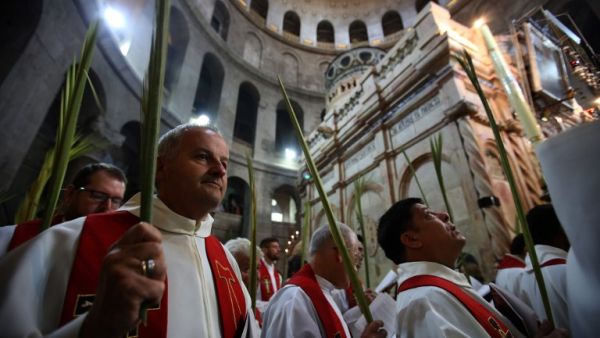Thousands of Christians descend upon Jerusalem's Old City during the Easter holiday to retrace what's said to be the route Jesus took on his way to be crucified, the Via Dolorosa.
For some, navigating the smooth, slippery stones and labyrinthine streets of the Old City between each Station of the Cross isn't enough. They want to imitate the circumstances as well.
After being sentenced to death, Jesus carried the cross he would later be nailed upon through the streets of Jerusalem, according to the Bible. His encounters and falls along the way are the Stations of the Cross, which are symbolically recreated in churches worldwide.
Every year, pilgrims manage to produce wooden crosses of all sizes that they carry with them as they march along the Via Dolorosa towards the Holy Sepulchre, where tradition says Jesus was buried.
While some pilgrim groups may bring their own wooden cross, "usually it is very unromantic," says Father Andreas Fritsch of the Christian Information Centre.
A man at the First Station - "whose name I don't know, but everybody down there knows him" - will rent interested parties and those in the know a roughly 1.8-metre-tall wooden cross.
The vendor across from the First Station, the Church of the Flagellation, is selling crowns of thorns, in a stack so high they resemble a ream of barbed wire, for 20 shekels (5 dollars). He says Mazen is the one to ask for and points to the church's courtyard.
The sun beams across the courtyard near where, according to Christian tradition, Jesus was beaten and sentenced to death. Tourists in matching caps take photos and slowly circulate, never straying far.
There are no rental signs, no shouting salesmen, no crosses on display. Just a few men on the stairs under the entry arch who are obviously not tourists. A tall man in a blue suit claims to be Mazen.
Around the back of a kiosk at the courtyard entrance, Mazen lifts up a black garbage bag to reveal two large crosses and picks one up.
The crosses, about as heavy as a bag of apples, can be rented to carry along the Via Dolorosa for 50 dollars each and then the renter can drop it off at the last station, the Coptic Church of St. Helena.
One of the men standing with Mazen recommends sharing the burden of the cross with a group - not only weight-wise, but financially as well. "Then it costs only 5 or 10 dollars per person," he says.
Mazen, however, won't give an exact figure for how many crosses there are in total nor whether he's set up year-round or just for Easter.
Depending on who's asking, the men renting out crosses will give different answers, from what their names are to their business ties.
Merchants in the Old City can be understandably wary when answering questions, especially if they are not working from a store front.
Since October 2015, when a wave of violence racked the city with a series of stabbings and car rammings, businesses in East Jerusalem have repeatedly accused Israeli police of cracking down, especially after any new attacks in Jerusalem, the Haaretz newspaper reported.
After two police officers were stabbed at Herod's Gate in September 2016, merchants in the area were forced to close down for several hours, Haaretz reported, adding that police said that the decision was made based on operational and professional reasons.
Two Palestinians - a 17-year-old man and a 49-year-old woman - have been shot and killed in Jerusalem within the last three weeks during stabbing attacks against Israeli police and security officers.
Ahead of Easter, which this year falls during the Jewish holiday of Passover, Israeli police have stepped up security, with "a wide range of units such as special patrol units, border police and undercover units" being put in action, said police spokesman Micky Rosenfeld.
A few days before Good Friday - the day commemorating Jesus' crucifixion before he is believed to have risen from the dead three days later, Easter - the security officers at a main corner of the Via Dolorosa seem as bored as ever, and noone is toting a cross.
But it will be different on Good Friday, says Mazen. There are no reservations, so "come very early if you want to rent a cross."
By Miranda Lee Murray and Maher Abukhater








